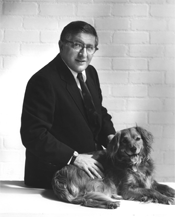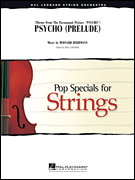Psycho (Prelude)
Buy this item (out of stock)
Product ID: HL2 04626004
By Bernard Herrmann
published: 1960
Publisher:
Hal Leonard
Arranger:
Lavender
Series:
Pop Specials for Strings
Genre:
Film Music, Haloween
Line Up:
String Orchestra
Level: 3
Set & Score
This item is out of stock
Reviews and rating
No review available, be the first to write one!

Composer
Bernard Herrmann (1911-1975)

Bernard Herrmann (June 29, 1911 – December 24, 1975) was an American composer noted for his work in motion pictures.
An Academy Award-winner (for The Devil and Daniel Webster, 1941), Herrmann is particularly known for his collaborations with director Alfred Hitchcock, most famously Psycho, North by Northwest, The Man Who Knew Too Much, and Vertigo. He also composed notable scores for many other movies, including Citizen Kane, The Ghost and Mrs. Muir, Cape Fear, and Taxi Driver. He worked extensively in radio drama (most notably for Orson Welles), composed the scores for several fantasy films by Ray Harryhausen, and many TV programs including most notably Rod Serling's The Twilight Zone and Have Gun–Will Travel.
Herrmann, the son of a Jewish middle class family of Russian origin, was born in New York City. He attended high school at DeWitt Clinton High School, at that time on 10th avenue and 59th Street in New York City.[1] His father encouraged music activity, taking him to the opera, and encouraging him to learn the violin. After winning a $100 composition prize at the age of thirteen, he decided to concentrate on music, and went to New York University where he studied with Percy Grainger and Philip James. He also studied at the Juilliard School and, at the age of twenty, formed his own orchestra, The New Chamber Orchestra of New York.
In 1934, he joined the Columbia Broadcasting System (CBS) as a staff conductor. Within two years he was appointed music director of the Columbia Workshop, an experimental radio drama series for which Herrmann composed or arranged music (one notable program was The Fall of the City). Within nine years, he had become Chief Conductor to the CBS Symphony Orchestra. He was responsible for introducing more new works to U.S. audience than any other conductor — he was a particular champion of Charles Ives's music, which was virtually unknown at that time. Herrmann's radio programs of concert music, which were broadcast under such titles as Invitation to Music and Exploring Music, were planned in an unconventional way and featured rarely-heard music, old and new, which was not heard in public concert halls.
More info about the composer...



 Click above to view samples
Click above to view samples
